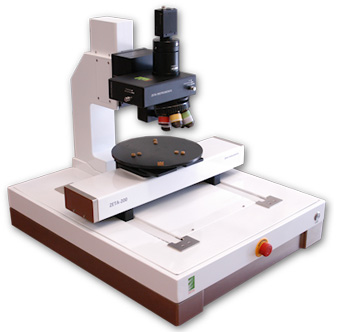Mar 28 2012
Zeta Instruments, Inc., a leading provider of cost-effective, precision optical profilers for micron-scale surface analysis, announced that ASYS Automation Systems, Germany, has selected its Zeta-200 optical profiler to assure its screen printing systems meet the exacting requirements of its solar cell manufacturing customers.
A global leader in the manufacturing and supply of screen printers for the electronics and photovoltaics industries, ASYS provides the screen printers used by solar cell manufacturers worldwide to apply the metal contact lines on solar cell wafers. Screen-printing is an essential component of the manufacturing process and the precision and thickness of the contact lines is critical to the effectiveness and cost of manufacturing solar cells.
 Zeta-200™ optical profiler from Zeta Instruments.
Zeta-200™ optical profiler from Zeta Instruments.
ASYS will use the Zeta-200 optical profiler to qualify its screen printing equipment prior to supplying them to solar customers as well as in the development and qualification of its next-generation screen printing systems.
Zeta's innovative Zeta-200 optical profiler monitoring technology makes it possible to control etchant compounds composition and their duration of exposure on silicon wafers to produce surface textures that optimize light absorption of solar cells. Through the use of these methods, it is possible to significantly improve the efficiency and manufacturing consistency of photo-voltaic cells.
ASYS Germany's Product Manager New Technologies, Dr. Sven Hermann, stated, "The Zeta-200 optical metrology system, enables us to deliver screen printers that meet the highest levels of quality assurance and bring peace of mind that the systems that we deliver to the burgeoning solar wafer industry set the gold standard for quality and reliability."
The Zeta-200 microscope system leverages Zeta's patented Z-Dot technology to provide rapid 3D imaging of deep, high-aspect ratio features, enabling the gathering of step height, roughness, dimensions, angles and volume, all without contacting or damaging the sample. It permits the imaging of complex, non-flat surfaces that have very high roughness and/or low reflectivity - especially aiding solar cell research by making it possible to inspect surfaces that are both rough and reflect very little light.
Coupled with its application-specific software, the Zeta-200 provides imaging and measurement capabilities superior to those of laser confocal microscopes. Zeta offers true-color imaging, lowers system cost and provides a simpler overall design for lower maintenance and greater ease of use. Other solutions such as interferometer-based microscope systems require meticulous sample alignment and have difficulty or are unable to effectively measure deep-feature samples such as those used in MEMS, while Scanning Electron Microscopes (SEMs) provide very high-resolution imaging but require lengthy, often destructive, sample preparation and cannot provide true-color images.
Zeta Instruments president, Rusmin Kudinar, noted, "We are delighted that ASYS has chosen the Zeta-200 as the solution of record for this critical function in the delivery of world class screen printers and are proud to be an integral part of their ongoing product development and qualification process moving forward."
Zeta will showcase the Zeta-200 at the upcoming Intersolar North America conference in San Francisco, CA, July 9-12, 2012.